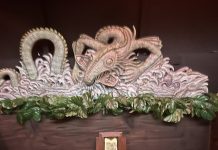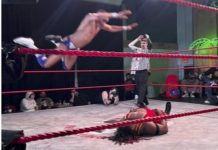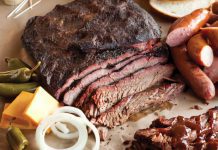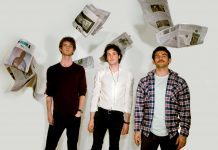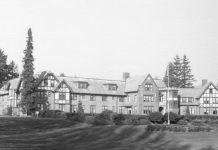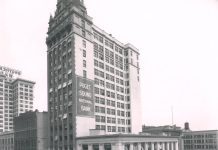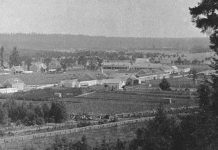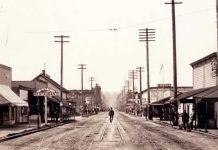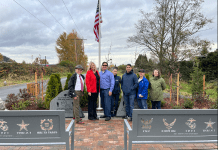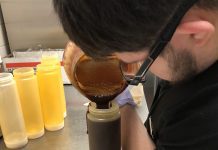By Steve Dunkelberger
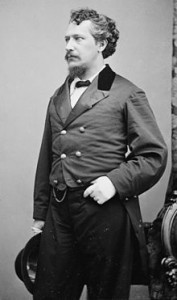
Anyone who knows anything about Tacoma knows that it is best described as “quirky.” It’s a place where the boss wears jeans and has a goatee, tattoos and a brilliant mind. It is a place where its residents joke about how “gritty” their hometown is but fight out-of-towners who join in on their self-deprecating humor. It is a town where people love public art so much, they have to reverently shoot it as they drive by.
And it has always been thus. Tacoma has a long history of quirks, dating back to its early days.
One of the biggest promoters of Tacoma’s quirky vibe was quirky himself. Others called him insane. But whatever the label, he left his mark on the “City of Destiny.” He coined the phrase, after all.
The storied tale of George Francis Train started with his birth on March 24, 1829, in Boston. His parents and three sisters died in a yellow fever epidemic in New Orleans in 1833 when George was 4-years-old. He was then raised by his strict Methodist grandparents in Boston. They hoped George would become a minister. He attended common schools. He did not go into the ministry as he sought more adventure in his life.
Train was what is known today as a “trust fund kid.” His family had made millions in ship building and transportation projects. That wealth allowed Train to seek fun and adventure without worrying about expense. He did what he wanted to do, and he did it how he wanted it done, in true Tacoma style. Train was the Howard Hughes or Sir Richard Branson of his day. He was rich. He was quirky, and he was bold. He considered himself a Renaissance man of poetry, adventure and world culture. The native New Englander promoted himself around the nation by regaling packed opera halls and theaters with his talks of globe-trotting adventure. One of those talks was in Tacoma in 1869. It was a rough and tumble town he soon adopted as his own.
This was a time when West Coast cities were battling to be the final destination of the yet-built Transcontinental railroad. Train played a vital role in that battle. Tacoma would win that battle in 1887 but eventually lose the war to be the Mahattan of the West. But that is a story for a different time.
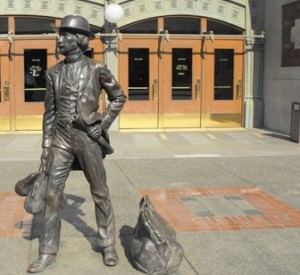
Three years after his first visit to Tacoma, Train ran for the position of “Dictator of the United States,” charging admission to his campaign rallies, drawing record crowds who were willing to pay to see this quirky millionaire ramble about his travels. He would end his rallies by greeting the crowds but would shake his own hand instead of those of potential voters, explaining that it was a custom he picked up in China. He supported temperance movements and women’s sufferage efforts, including helping Susan B. Anthony run her pro-voter newspaper, “The Revolution.” Train was also jailed for having defended Victoria Woodhull against obscenity charges for an issue her newspaper had published on an alleged adulterous affair that included such vivid details that brothel owners reportedly blushed. When his bid to be an American dictator failed, he promoted Tacoma as “the City of Destiny” because of its location to deep port waters and quick access to railroad service he helped fund. See, Train made millions in shipping and railroads, especially as a founder of Credit Mobilier, the investors of the Union Pacific Railroad that is the subject of the AMC show “Hell on Wheels.”
Promoting Tacoma promoted his railroad. Tacoma’s success meant the railroad’s success. And that meant money for Train. So Train linked Tacoma with success and prosperity at every event and speech he gave around the nation. As his audience joined him in a chant, Train came up with “City of Destiny” to promote the city. He would also have crowds chant, “Seattle! Seattle! Death Rattle, Death Rattle; Tacoma! Tacoma! Aroma, Aroma.” That last bit would mean he also crafted “Tacoma Aroma” that was made infamous during its pulp-making era.
Train would take that Tacoma promotion to a new level on March 18, 1890. A cannon echoed through Commencement Bay as Train sailed toward Japan that day with the intent of breaking the around-the-world record. It was his third around the world trip. His first trip in 1870 was covered by many newspapers and inspired Jules Verne’s 1873 novel “Around the World in Eighty Days.” His protagonist Phileas Fogg is believed to have been modeled on Train, who finished the trip in 80 days after all.
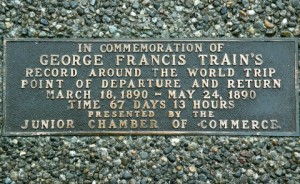
Train’s 1890 trip was partly self promotion and partly intended to put Tacoma on the map as the jumping off point for world travel. Train broke the record. He made it back to Tacoma in 67 days, 17 hours, 59 minutes and 55 seconds. A trip that started and ended in Tacoma’s Broadway, where a sidewalk marker outside the Knights of Pythias Temple honors the trip to this day.
He was a living legend until he died of smallpox in 1903, gaining headlines with everything he did.
“Mr. Train was at one time one of the best known Americans on the face of the globe,” Publisher’s Weekly wrote the year before his death. “He organized the clipper ship line that sailed around Cape Horn to San Francisco; he organized the Credit Mobilier and the Union Pacific Railroad; he was one of the organizers of the French Commune; he built the first street-railway in England; he has been the business partner of queens, emperors, and grand dukes, and the familiar friend of some of the greatest people in the world. His story up to the present is one long romance.”
The “New Beginnings” statue outside Tacoma’s Federal Courthouse bears a striking resemblance to Train and provides a fitting tribute to Tacoma’s quirky past that remains just as quirky today.






